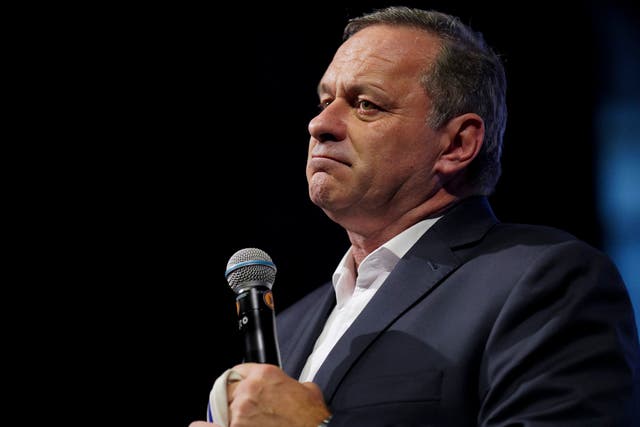
Uruguay’s leftist opposition candidate, Yamandu Orsi, has became the country’s new President after a tight run-off contest.
Mr Orsi’s victory ousts the conservative governing coalition and makes the South American nation the latest to rebuke the incumbent party in a year of landmark elections worldwide.
Even as the vote count continued, Alvaro Delgado, the presidential candidate for the centre-right ruling coalition, conceded defeat to his challenger amid muted scenes.

In sharp contrast, Mr Orsi told crowds of supporters: “The country of liberty, equality and fraternity has triumphed once again.
“I will be the president who calls for national dialogue again and again, who builds a more integrated society and country.”
As initial exit polls began showing Mr Orsi, 57, a working-class former history teacher and two-time mayor from Uruguay’s Broad Front coalition, holding a lead over Mr Delgado, cheers rang out across Montevideo’s beaches.

Mr Delgado told supporters gathered at his own party’s headquarters in the capital of Montevideo that he had lost. The crowd was hushed.
“With sadness, but without guilt, we can congratulate the winner,” he told them. “But it’s one thing to lose the elections and another to be defeated. We are not defeated,” he added, generating a burst of applause.
A political heir to former President Jose “Pepe” Mujica, an ex-Marxist guerilla who became a global icon for transforming Uruguay into one of the most liberal and environmentally sustainable nations in the region, Mr Orsi rode to power on promises of safe change and nostalgia for his left-wing party’s redistributive social policies.
He struck a conciliatory tone, vowing to unite the nation of 3.4 million people after such a tight vote.

“Let’s understand that there is another part of our country who have different feelings today,” he said, as fireworks erupted over his stage overlooking the city’s waterfront. “These people will also have to help build a better country. We need them too.”
With nearly all the votes counted, electoral officials reported that Mr Orsi won 49.8% of the vote, ahead of Mr Delgado’s 45.9%, a clear call after weeks in which the opponents appeared tied in polls.
The rest cast blank votes or abstained in defiance of Uruguay’s enforced compulsory voting. Turnout in the nation with 2.7 million eligible voters reached almost 90%.
Analysts say that the candidates’ lacklustre campaigns failed to entice apathetic young people and generated unusual levels of voter indecision.
But with the rivals in broad consensus over key issues, the level-headed election was also emblematic of Uruguay’s strong and stable democracy, free of the anti-establishment fury that has vaulted populist outsiders to power elsewhere, like the United States and Argentina.
Mr Orsi’s win ushers in a return of the Broad Front that governed for 15 consecutive years until the 2019 election of centre-right President Luis Lacalle Pou.

“I called Yamandu Orsi to congratulate him as President-elect of our country and to put myself at his service and begin the transition as soon as I deem it appropriate,” Mr Lacalle Pou wrote on social media platform X.
The opposition’s upset was the latest sign that simmering discontent over the post-pandemic economic malaise favours anti-incumbent candidates. In the many elections that took place during 2024, voters frustrated with the status quo have punished ruling parties from the US and UK to South Korea and Japan.
But unlike elsewhere in the world, Mr Orsi is a moderate with no plans for dramatic change. He largely agrees with his opponent on driving down the childhood poverty rate, now at a staggering 25%, and containing an upsurge in organised crime that has shaken the nation long considered among Latin America’s safest.
Mr Orsi is also likely to scupper a trade agreement with China that Mr Lacalle Pou pursued to the chagrin of Mercosur, an alliance of South American nations promoting regional commerce.
Despite Mr Orsi’s promise to lead a “new left” in Uruguay, his platform resembles the mix of market-friendly policies and welfare programmes initiated under President Mujica and other Broad Front leaders.
From 2005-2020, the coalition presided over a period of robust economic growth and pioneering social reforms that won widespread international acclaim, including the legalisation of abortion, same-sex marriage and the sale of marijuana.


Why are you making commenting on The Herald only available to subscribers?
It should have been a safe space for informed debate, somewhere for readers to discuss issues around the biggest stories of the day, but all too often the below the line comments on most websites have become bogged down by off-topic discussions and abuse.
heraldscotland.com is tackling this problem by allowing only subscribers to comment.
We are doing this to improve the experience for our loyal readers and we believe it will reduce the ability of trolls and troublemakers, who occasionally find their way onto our site, to abuse our journalists and readers. We also hope it will help the comments section fulfil its promise as a part of Scotland's conversation with itself.
We are lucky at The Herald. We are read by an informed, educated readership who can add their knowledge and insights to our stories.
That is invaluable.
We are making the subscriber-only change to support our valued readers, who tell us they don't want the site cluttered up with irrelevant comments, untruths and abuse.
In the past, the journalist’s job was to collect and distribute information to the audience. Technology means that readers can shape a discussion. We look forward to hearing from you on heraldscotland.com
Comments & Moderation
Readers’ comments: You are personally liable for the content of any comments you upload to this website, so please act responsibly. We do not pre-moderate or monitor readers’ comments appearing on our websites, but we do post-moderate in response to complaints we receive or otherwise when a potential problem comes to our attention. You can make a complaint by using the ‘report this post’ link . We may then apply our discretion under the user terms to amend or delete comments.
Post moderation is undertaken full-time 9am-6pm on weekdays, and on a part-time basis outwith those hours.
Read the rules hereLast Updated:
Report this comment Cancel